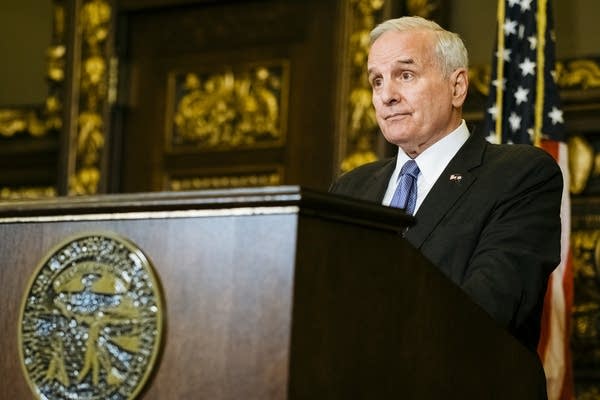MN Supreme Court set to hear appeal on Dayton's vetoes

Go Deeper.
Create an account or log in to save stories.
Like this?
Thanks for liking this story! We have added it to a list of your favorite stories.
All three branches of government will converge in a state Capitol courtroom Monday morning as lawyers argue over the constitutional powers of Minnesota's governor.
Gov. Mark Dayton is asking the Minnesota Supreme Court to overturn a lower court's ruling that his line-item vetoes of funding for the House and Senate violated the separation of powers clause of the state constitution by preventing the Legislature from exercising its duties.
Dayton zeroed out the funding for the House and Senate to try to lure Republican leaders back into negotiations on a handful of tax and policy items that he already signed into law. That led leaders to sue the governor, and they won the first round in Ramsey County District Court.
"We just don't believe it's right for a governor, if he doesn't like someone or a different branch of government, to just attempt to eliminate it. That's sandbox politics," said House Speaker Kurt Daudt, R-Zimmerman.
Turn Up Your Support
MPR News helps you turn down the noise and build shared understanding. Turn up your support for this public resource and keep trusted journalism accessible to all.
The district judge was correct in declaring Dayton's action unconstitutional, because it effectively abolished the Legislature, argued the Republicans' attorney Doug Kelley in a brief filed earlier this month. The Legislature's position is that Dayton exceeded his line-item veto authority and that the Supreme Court should "unequivocally reiterate" those limits while affirming the district court judgement.
Dayton's lawyer, Sam Hanson, countered that the line-item vetoes were valid and explicitly authorized under the Minnesota Constitution. The governor could have rejected the entire state government bill but chose a scalpel rather than sledgehammer approach, contends his brief, and the district judge was wrong to question the governor's motives.
"This is an interpretation of a reading of the constitution, which I still am very confident that I'm right. We'll see what the Supreme Court says," Dayton said.
Dayton wanted lawmakers to reverse tax breaks for tobacco products, estates and business property. He also wanted them to undo policy provisions related to drivers' licenses for unauthorized immigrants and a new teacher licensing system.
"More than even the court case, I wanted to draw attention to the five issues I raised, the three tax-related and the other two, just to make people aware of just how reckless those decisions were by the Republican legislative majority," he said.
Dayton said he'll push for his positions in the 2018 session. But it won't be easy.
Senate Majority Leader Paul Gazelka, R-Nisswa, said he views them as settled matters. Gazelka said he doesn't believe the court case will harm the Legislature's working relationship with the governor moving forward. Others disagree.
Hamline University political science professor David Schulz said he believes a court loss would hinder Dayton in his remaining time in office.
"Clearly, Mark Dayton going now into his last 13, 14, 15 months in office will be even dramatically weaker than he would have been normally as a lame duck. So, this has huge political and legal repercussions for Dayton's closing year," Schulz said. "I think it also has huge implications for the governor's race next year."



